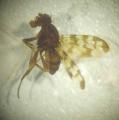Diptera.info :: Miscellaneous :: The Lounge
Who is here? 1 guest(s)
|
How ethyl Acetate kill?
|
|
| zcuc |
Posted on 16-03-2008 21:02
|
|
Member Location: Israel Posts: 492 Joined: 08.10.07 |
Hi, Does anyone know how exactly ethyl Acetate kill insects? is it a poison? suffocating? or else... I ask because most of the insects are stunned quickly by it but some insects, if taken out from the killing jar, somehow revived and looks healthy again. So I guess the ethyl doesn't do any permanent damage if not applied too long? |
|
|
|
| jorgemotalmeida |
Posted on 16-03-2008 21:45
|
|
Member Location: Viseu - PORTUGAL Posts: 9296 Joined: 05.06.06 |
I think that in blood, rapid biotransformation of ethyl acetate occurs by plasma esterases (that are enzymes) resulting in acetic acid and ethanol. This can trigger the death of cells... Maybe you refer to the coleopters that have a much harder protection. Maybe their metabolism neutralizes the action of ethyl acetate. Edited by jorgemotalmeida on 16-03-2008 21:55 |
| Philippe moniotte |
Posted on 17-03-2008 08:25
|
|
Member Location: Heron, Belgium Posts: 865 Joined: 14.10.05 |
In common with many organic solvents, Ethyl acettae cause narcosis and subsequent heart function stoppage in mammals; Its action is more likely to be due to interference with nerve function rather than massive intoxication. Perhaps it is the same with other life forms such as insects. As with most anaesthetics, the effect is first reversible, but at higher dose/longer exposure it becomes lethal. One can presume that those insects that resist have a slower metabolism than those which succomb, in other words, they take longer to die ... |
|
|
|
| Tony Irwin |
Posted on 17-03-2008 21:04
|
|
Member Location: Norwich, England Posts: 7336 Joined: 19.11.04 |
There are interesting differences between families of flies that I have noticed in their reaction to ethyl acetate. For example, if the exposure is not long enough, or the concentration not strong enough, Lonchaeidae are among the first flies to recover. Perhaps something in their metabolism makes them particularly resistant?
Tony ---------- Tony Irwin |
|
|
|
| phil withers |
Posted on 17-03-2008 22:57
|
|
Member Location: Lyon, France Posts: 521 Joined: 04.03.08 |
In harmony with what Tony states (there's a rarity), I find it generally true that wood-breeding diptera have a greater resistance to ethyl acetate; don't know why, but they do get up any walk around long after you think they should decently be dead. And as for sawflies... |
|
|
|
| Susan R Walter |
Posted on 18-03-2008 14:52
|
|
Member Location: Touraine du Sud, central France Posts: 1802 Joined: 14.01.06 |
Wood gives off all sorts of gaseous chemicals, so maybe the wood breeders have had to adapt to less than ideal micro-atmospheres. Just a thought - nothing to really back it up.
Susan |
| Philippe moniotte |
Posted on 18-03-2008 18:34
|
|
Member Location: Heron, Belgium Posts: 865 Joined: 14.10.05 |
An interesting theory indeed and a nice subject for a PhD thesis  Another aspect that always puzzled me is that EA is advocated because it leaves the insects less stiff after death and easier to mount and spread. I wonder if anybody knows why ? Philippe |
|
|
|
| Jump to Forum: |













